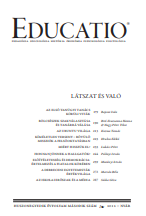Az első tanügyi tanács körüli viták
Debates About the first Hungarian Council for Public Education
Author(s): Iván BajomiSubject(s): Politics, Education, Law, Constitution, Jurisprudence, Public Law, Government/Political systems, State/Government and Education
Published by: Akadémiai Kiadó
Keywords: Hungary; education; public education; Hungarian Council; education system; government; legislation;
Summary/Abstract: First, the author makes some remarks concerning the fact that in the context of the nationalization of schools previously maintained by local governments and a lack of negotiations between government and interest groups, the new Hungarian law adopted in December 2012 does not mention consultative bodies dealing with primary and secondary education created in Hungary in 1993. In a historical part of the article (based on many documents that the author found in libraries), Ivan Bajomi shows how Hungary’s first National Council of Public Education was created 140 years ago, in 1872. The creation of this body was first proposed in 1866, one year before the Austro-Hungarian Compromise that initiated a liberalisation of the authoritarian form of government preceding it. The proposition was formulated by “knowledge-broker” Gyula Schvarz, a scientist speaking many foreign languages and who looked at several Western educational systems. Three years after publication of the idea, the association of secondary school teachers pronounced in favor of the creation of an educational council too, pointing to the necessity of assuring the best form of preparation for educational reforms. After the summer and autumn of 1871, the Ministry of Education published a vehemently criticized draft of the decree on the status of the future Hungarian Council of Public Education. On the basis of information concerning the role of local and national teacher’s councils in several cantons of Switzerland and territories of the existing Germany, members of the association of primary school teachers of the capital of Hungary argued that the planned body would not have sufficient autonomy. Within the framework of this debate, some influential persons contested the right of the planned council’s members to formulate initiatives autonomously though, finally, this possibility was maintained in the decree; others argued that future members of the body should receive money for their work, and the terms of the decree were in the end changed to grant this. Acceptance of this change probably came from the fact that one of the main functions of the body was intense participation in elaboration of new school curricula. In the four first years of the first Hungarian Council of Public Education, several members of bodies were delegated by teachers’ associations, yet from 1875 members were chosen by the responsible minister.
Journal: Educatio
- Issue Year: 21/2012
- Issue No: 2
- Page Range: 179-189
- Page Count: 11
- Language: Hungarian

